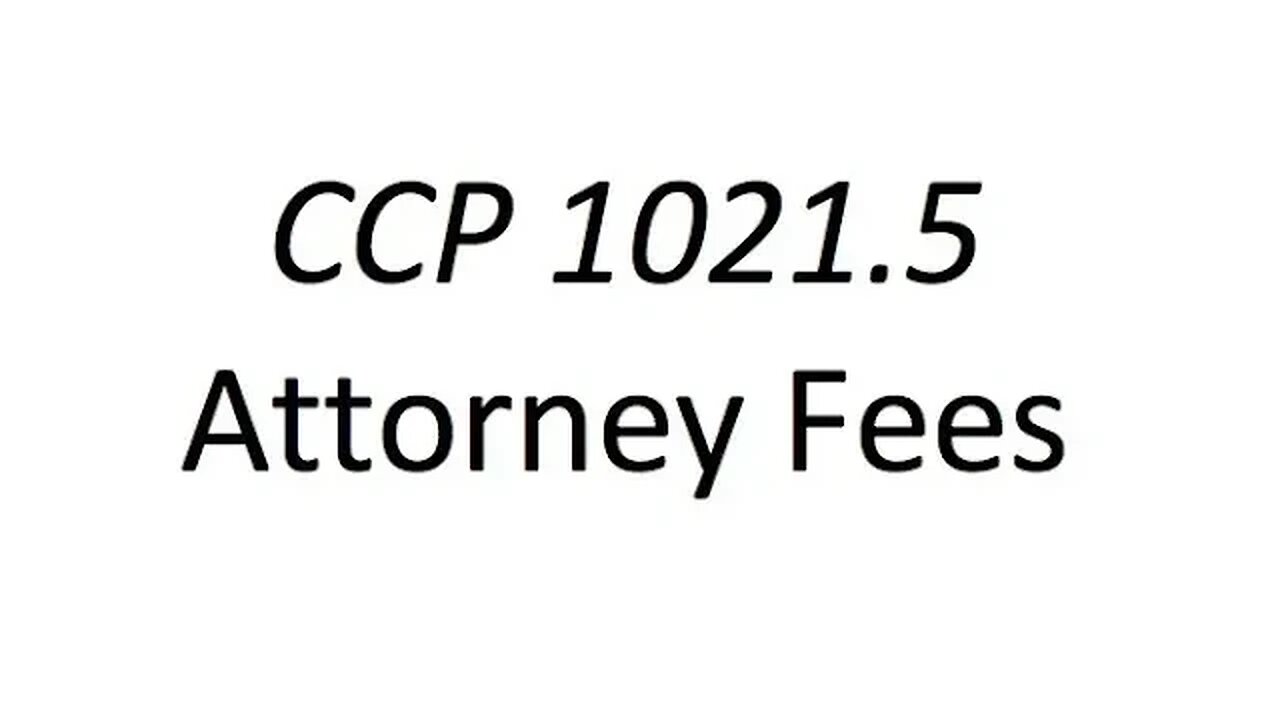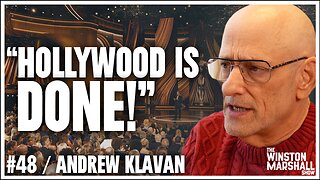Premium Only Content

California CCP 1021.5 Private Attorney General explained
Code of Civil Procedure section 1021.5 by The Law Offices of Steven C. Vondran, P.C. General legal information only. YES YOU CAN SHARE 0UR VIDEOS ON YOUR SOCIAL MEDIA NETWORKS.
This is a great video if you are a Plaintiff in the great state of California (ex. Los Angeles, San Francisco, Orange County, San Diego, etc.) and you need to find a way to get your attorney fees covered.
AMERICAN RULE – Litigants pay their own way unless there is a contract or statute (CCP 1021). But if you can meet standards of CCP1021.5 = seek attorney fees.
GENERAL RULE
Upon motion, a court may award attorneys' fees to a successful party against one or more opposing parties in any action which has resulted in the enforcement of an important right affecting the public interest if:
(a) a significant benefit, whether pecuniary or nonpecuniary, has been conferred on the general public or a large class of persons,
(b) the necessity and financial burden of private enforcement, or of enforcement by one public entity against another public entity, are such as to make the award appropriate,
Ex. The cost of the litigation must place a burden on the litigant that is out of proportion to the litigant’s personal interest in the lawsuit. The litigant bears the burden of showing that their personal stake was not sufficient by itself to justify the lawsuit.
“Successful party” (open to interpretation – got what they wanted). Look at pleadings, did Plaintiff meet their “litigation objectives?”
and
(c) such fees should not in the interest of justice be paid out of the recovery, if any
PRIVATE ATTTORNEY GENERAL DOCTRINE
California courts have inherent equitable authority under the “private attorney general” doctrine to award attorney fees to litigants who “successfully” pursue public interest litigation vindicating important rights. See Alyeska Pipeline Service Co. v. Wilderness Society (1975) 421 U.S. 240, (rejecting the equitable private attorney general doctrine in federal courts.)
The case must have “resulted in the enforcement of an important right affecting the public interest"; and, have conferred "a significant benefit, whether pecuniary or nonpecuniary, on the general public or a large class of persons.”
Burden is on the plaintiff to establish that the litigation costs transcended its personal interest. Best if can show litigant’s personal stake in the outcome is minimal.
EXAMPLES
• class actions
• consumer protection lawsuits
• environment (land use) cases
• employment discrimination cases
• any case where you can make the argument
CATALYST THEORY
California Courts also recognize a CATALYST theory (Plaintiff’s lawsuit is a catalyst for changing Defendants conduct) and plaintiffs’ attorneys can recover their fees when it is shown plaintiffs’ lawsuit was a “catalyst” for the defendant to modify its behavior. Tipton-Whittingham v. City of Los Angeles (2003) 316 F 3d 1058.
See Graham v. DaimlerChrysler Corp. (2004) 34 Cal 4th 553, DaimlerChrysler, ’98-’99 Dakota trucks ADVERTISED as having a 6,400-pound towing capacity (but could tow 2,000 pounds). DaimlerChrysler notified customers and offered cash / merchandise as compensation. Local district attorney wanted to get involved and bring suit for false advertising.
Plaintiffs filed complaint seeking return of their payments, compensatory damages and attorneys’ fees. Within three weeks of the lawsuit, Daimler Chrysler offered to replace or repurchase all buyer’s trucks. Plaintiffs’ case was later dismissed as moot, but Court awarded nearly one million dollars in Attorney fees.
COMMON FUND
California also recognizes equitable “common fund” and “substantial benefit” theories, (creating a fund for the benefit of non-litigants).
NEED TO SEND A DEMAND LETTER FIRST?
Grimsley v. Board of Supervisors (1985) 169 Cal. App. 3d 960. California Supreme Court held attorney fees under section 1021.5, will not be awarded unless the plaintiff seeking such fees had reasonably endeavored to enforce the public right affecting the public interest, without litigation and its attendant expense.” (Grimsley, supra, 169 Cal. App. 3d at p. 966.)
AttorneySteve.com
The First Name in Legal Services
-
 58:14
58:14
Winston Marshall
2 hours agoHollywood Insider SPEAKS OUT On Woke Hollywood & Trump’s A-List Allies | Andrew Klavan
3.05K8 -
 UPCOMING
UPCOMING
Game On!
1 hour agoTom Brady's BIG GAMBLE! Pete Carroll new head coach of the Raiders! | Crick's Corner
28 -
 17:26
17:26
Tactical Advisor
2 hours agoEverything New From Primary Arms 2025
1581 -
 LIVE
LIVE
The Charlie Kirk Show
1 hour agoThe Greatest Pro-Life President + AMA | Gingrich | 1.24.2025
7,915 watching -
 LIVE
LIVE
The Dana Show with Dana Loesch
1 hour agoThe Dana Show LIVE From SHOT Show | Day 3
584 watching -
 1:02:50
1:02:50
The Dan Bongino Show
3 hours agoAre You Tired Of Winning Yet? (Ep. 2408) - 01/24/2025
448K999 -
 48:57
48:57
The Rubin Report
1 day ago'Real Time' Crowd Stunned as Bill Maher Gives a Brutal Message to Democrats with Adam Carolla
39.8K37 -
 1:01:52
1:01:52
Dr. Eric Berg
3 days agoThe Dr. Berg Show LIVE January 24, 2025
15.8K7 -
 38:56
38:56
Tudor Dixon
3 hours agoFrom Mob Life to Redemption with Michael Franzese | The Tudor Dixon Podcast
2.71K -
 LIVE
LIVE
The Shannon Joy Show
2 hours ago🔥🔥LIVE - Exclusive With Paul Stone! The Race For REAL. Trump’s Tariff Talk Sparking Mega Interest Gold, Silver, Land & Hard Assets🔥
815 watching